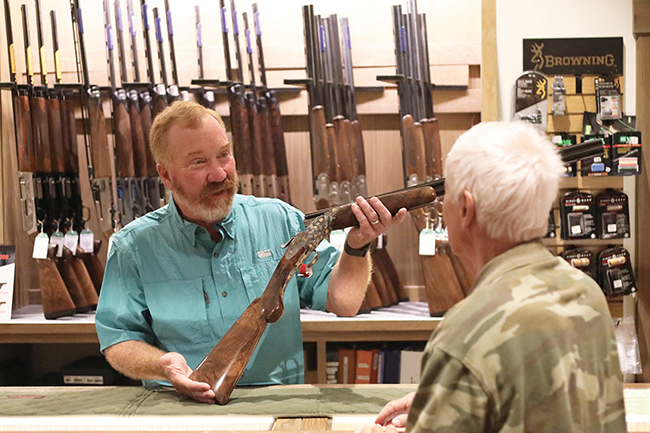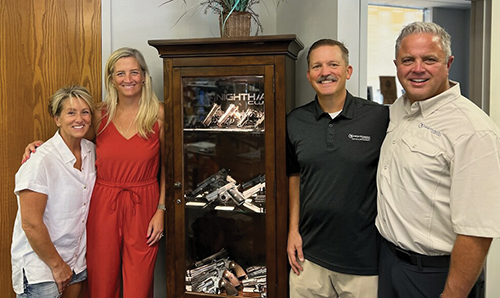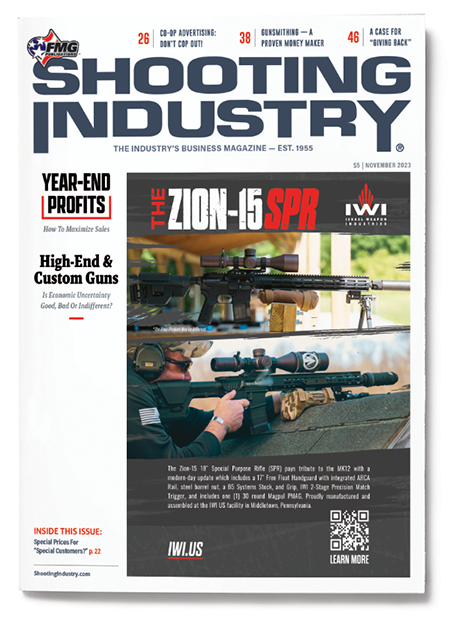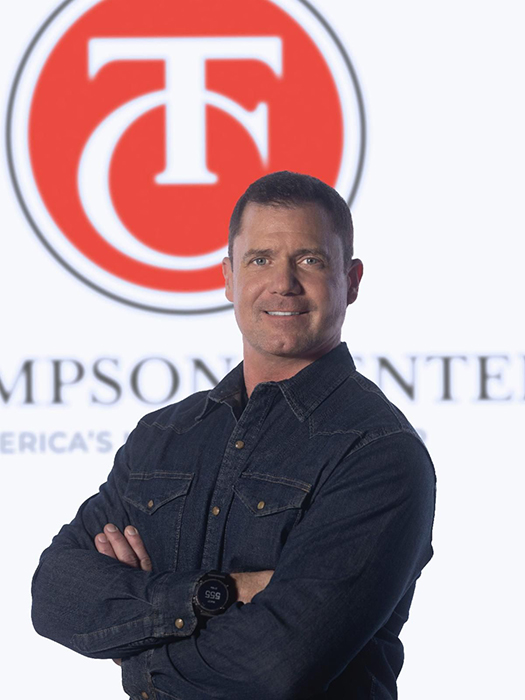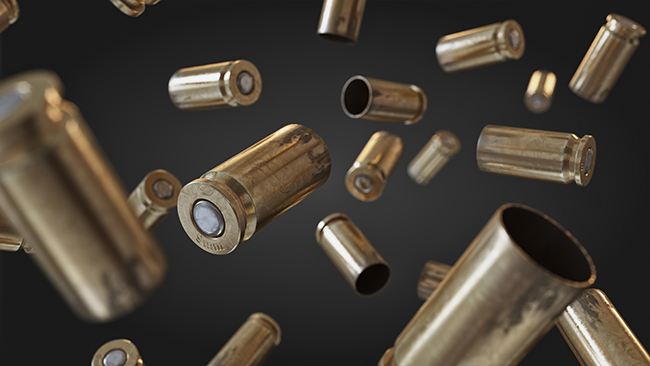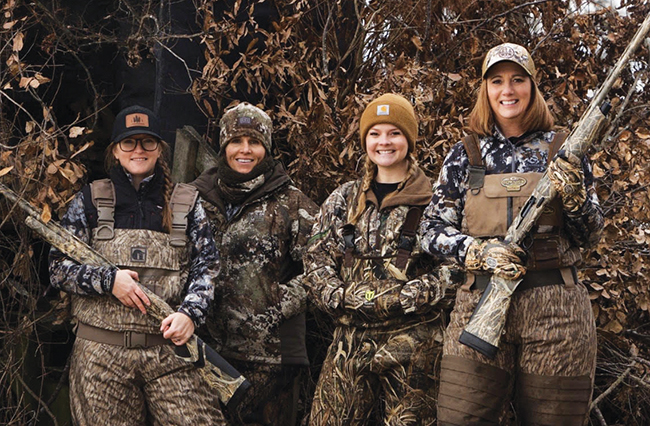High-End Guns — Worth The Risk?
Ever wondered how many GLOCKs you need to sell to match the return on a $5,000 Nighthawk Custom 1911 or even a $20,000 Caesar Guerini shotgun? Or more importantly: What does it take to put your store in a position to make those kinds of sales?
Bringing higher-end inventory into your shop is the easy part. The challenge is finding customers for those pricey pistols, shotguns and rifles after they land on your shelves.
It’s certainly not something you can jump into without a lot of planning and research. Do you have customers willing to spend several thousand dollars on a gun? And if not, can you find new customers?
It takes a slow, methodical approach, said Scott Ready, owner of Country Attic Treasures in South Lebanon, Ohio, where upper-tier brands include Nighthawk Custom, Staccato, Caesar Guerini, Ed Brown and Rizzini.
“It’s definitely a building process,” Ready remarked. “It’s difficult to carry a lot of expensive products when you’re not quite sure where the market is.”
Ready recalls his own process of becoming a dealer for both Nighthawk and Staccato. He started by bringing in a couple of guns at a time, only adding more as those sold. Customer demand grew as word got around that he was stocking the brands, giving him the comfort level needed to double or triple his inventory.
You also have to be willing to invest a large chunk of money in inventory (more on that later). A high-end 1911, alone, is likely to take the place of a half-dozen or more GLOCKs or Rugers.
“It’s definitely intimidating for a lot of people,” suggested Eddy Rodriguez, general manager of The Vault at Pistol Parlour in Mesa, Ariz., where exclusive brands include Wilson Combat, LWRCI, Taran Tactical and Nighthawk Custom.
“I don’t know that everyone should try to sell this kind of stuff,” he said. “I’ve seen it happen with some shops, where they end up selling it at a loss or barely breaking even because they don’t know what to do.”
Bringing higher-end inventory into your shop is the easy part. The challenge is finding customers for those pricey pistols, shotguns and rifles after they land on your shelves.
Relationships
When a store is full of the kinds of guns people expect to find in the typical gun store, it has a certain marketing advantage. A customer looking for a new SIG SAUER P320 or a GLOCK 19 expects to see it on the shelf of any store in their area. It’s a different story if you decide to start carrying custom 1911s from Cabot Guns or Alchemy Custom Weaponry.
Nobody expects to see guns like those in stock — unless the time and effort have been put into building your reputation and relationships with the right customers. It’s been key for Jess Hancock, owner of The Wichita Gun Club in Wichita, Kan., where high-end brands also include Nighthawk, Korth, Staccato and Wilson Combat.
“We’re matched up with these people,” Hancock confirmed. “I think we have a really good reputation in the industry and online for sure.”
This has been accomplished by reaching out to collectors and cultivating a social media presence on sites like TikTok and Facebook, which he sees as critical — even if the sites’ anti-gun content rules make it a challenge.
“We sell a ton of guns off Facebook. We just have to play by the rules,” Hancock relayed. “You can’t have a price tag showing, but we can use words like ‘available’ or ‘just arrived’ in the store today.”
It requires more than just a social media presence. The Wichita Gun Club is constantly managing relationships with specific customers. They keep a book with notes on which customers are looking for hard-to-find and custom guns. Then when they get a line on something, they can make a quick sale.
“I’ve got a guy right now who is looking for a complete set of Colt snake guns from the ’60s and ’70s. He’s looking for original boxes, original paperwork and unfired guns,” he said.
When telling someone you’ll keep an eye out for something, you need to mean it, contends Rodriguez, from Arizona. Making that connection later with the customer — even if they’ve changed their mind — forms an important impression that can pay dividends down the line.
“The gun industry is the biggest smallest industry,” Rodriguez observed. “Word of mouth is very important. So, if you treat people well, they’ll tell their friends, their friends will tell their friends and so on.”
Keeping Inventory Fresh
One of the most significant challenges with high-end inventory is the lead time for many of these pistols, rifles and shotguns. Depending on which company you are ordering from, it could take months, or even years, before the order is filled. It takes planning, commitment and a willingness to invest a lot of capital to maintain your position as a dealer in premium firearms.
The Wichita Gun Club, a longtime Nighthawk dealer, has a constant flow of orders with the Arkansas-based gunmaker.
“In the last five or six weeks, I’ve been getting guns I ordered in May of 2021,” Hancock explained.
This makes it critical to understand what your customers will buy, said Rodriguez, from Pistol Parlour: “There are some brands we’ve gotten into that we’ve found aren’t going to be the best movers. So, it becomes a question of whether you keep reordering, or do you just kind of tone it down a little more?”
Another option is to encourage customers to place custom orders directly through you with the premium gunmakers. This can be advantageous for those high-end shoppers looking for a gun with extremely specific features.
“Most of the time the guys who are looking for these products know what they’re looking for,” noted Ready in Ohio. “They want a specific model.”
His shop does a lot of pre-orders for those customers, with a small deposit. They pair this with a layaway program that can be used if the gun arrives sooner than expected.
“These are guns someone may be really stretching to buy. It might be the only $5,000 gun they ever buy,” Ready reasoned. “They may be caught off guard and surprised if it arrives early.”
What If They Don’t Sell?
There’s also the question of how long you can afford to hold onto these premium guns if they don’t sell quickly. This could depend on a couple of factors, including how you paid for the inventory.
The Wichita Gun Club, operating partially off lines of credit, prefers not to hold anything longer than 90 days. Anything longer risks having interest payments eat too deeply into profit margins. It’s particularly true these days with borrowing rates on the rise.
Once that 90-day mark approaches, Hancock is often ready to offer incentives. One of those is a $50 store gift card that becomes available the day after the purchase.
“The point behind this is getting them back into the store a second time,” he explained. “We’ve learned over the years you can’t just do $50 off because they’ll just come in and do the $50 offer and not come back.”
The equation is different is purchases are self-capitalized.
“If you can do that, you can afford to hang onto inventory for years if you have to, especially if your margins are strong,” said Ready in Ohio.
The high-end guns also tend to appreciate in value over time. So, if you find yourself holding onto a Caesar Guerini shotgun for a year or longer, it’s eventually going to look like a bargain for customers — or you can raise the selling price.
In the end, what’s important is carrying the type of firearms that match your reputation as a premium dealer.
“There’s certainly a risk in tying up your money,” Ready noted, “but there’s also a risk in not having the inventory.”
“I don’t know that everyone should try to sell this kind of stuff. I’ve seen it happen with some shops, where they end up selling it at a loss or barely breaking even because they don’t know what to do.”
Eddy Rodrigue, General Manager
The Vault at Pistol Parlour Mesa, Ariz.
The Used Market
There’s no reason to rely only on manufacturers for higher-end offerings. Consider tapping into the used market, particularly if you are willing to deal with large collections.
This has long been a strategy for the Wichita Gun Club. Hancock has traveled around the country to buy from collectors or their spouses and children. On the plus side, this has given his store access to rare guns (from custom makers and historical pieces). On the downside, those collections often include some less desirable guns.
“You get the good, the bad, the ugly,” Hancock admitted. “If you look on my GunBroker.com, I think there’s four or five selling right now that are penny auctions. You get some crap that comes in. You just throw them up for a penny and sell them ‘as is’ and gunsmith specials and you just get them out of there.”
While the store has often purchased entire collections, changes in the economy have prompted a shift to more consignment deals. Unless the seller is eager to be rid of the collection, consignment offers them a chance to make more money from their guns and keeps your store from having to commit financial resources.
“It’s a big opportunity to control your inventory,” said Ready, with Country Attic Antiques, where virtually all used guns are taken in through consignment.
The store has taken in collections as large as 80 or 90 guns through its consignment program. The shop takes a set sales commission, which means the sellers can get substantially more money compared to a direct sale to the store.
“I think it works better for us. And I think it works better for the customer,” Ready proposed. “It’s very transparent. The seller knows exactly what he’s going to make and he knows exactly what I’m going to make.”
All in all, the risks of expanding your offerings of high-end, collectible guns are well worth it if you can get the inventory mix right.

